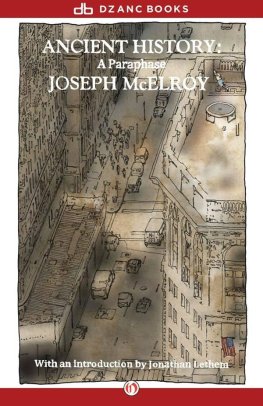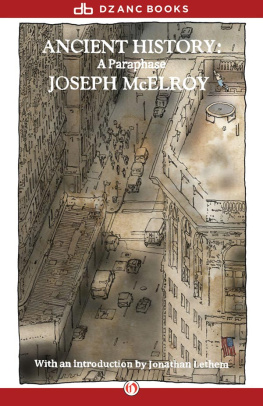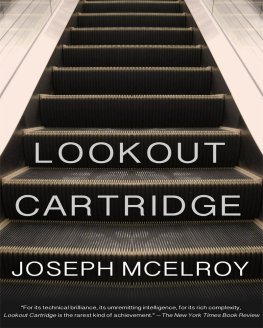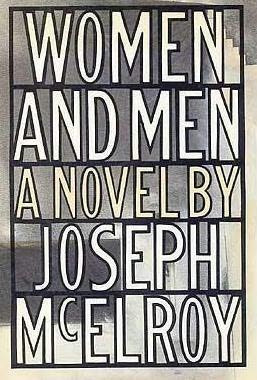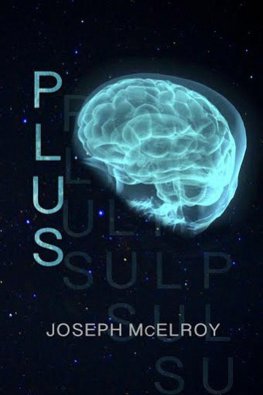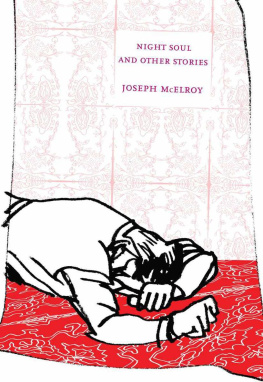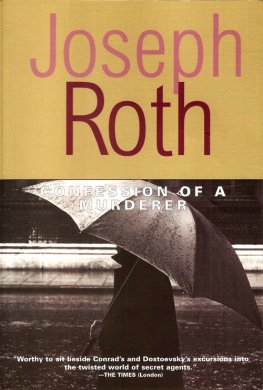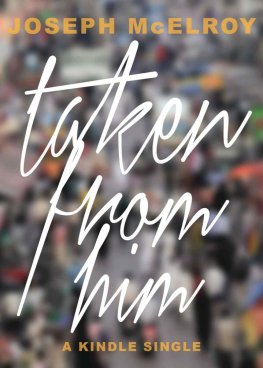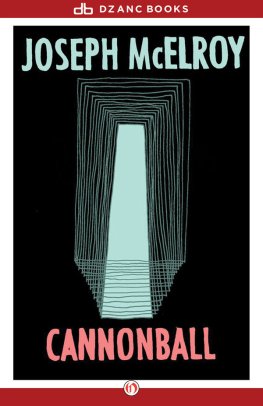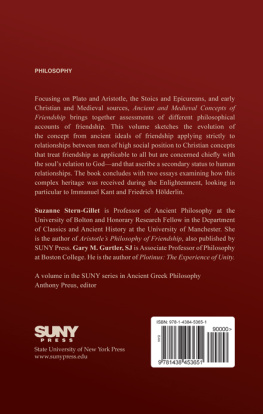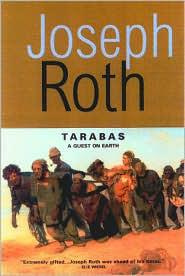Joseph McElroy - Ancient History: A Paraphrase
Here you can read online Joseph McElroy - Ancient History: A Paraphrase full text of the book (entire story) in english for free. Download pdf and epub, get meaning, cover and reviews about this ebook. year: 2014, publisher: Dzanc Books, genre: Prose. Description of the work, (preface) as well as reviews are available. Best literature library LitArk.com created for fans of good reading and offers a wide selection of genres:
Romance novel
Science fiction
Adventure
Detective
Science
History
Home and family
Prose
Art
Politics
Computer
Non-fiction
Religion
Business
Children
Humor
Choose a favorite category and find really read worthwhile books. Enjoy immersion in the world of imagination, feel the emotions of the characters or learn something new for yourself, make an fascinating discovery.
- Book:Ancient History: A Paraphrase
- Author:
- Publisher:Dzanc Books
- Genre:
- Year:2014
- Rating:3 / 5
- Favourites:Add to favourites
- Your mark:
- 60
- 1
- 2
- 3
- 4
- 5
Ancient History: A Paraphrase: summary, description and annotation
We offer to read an annotation, description, summary or preface (depends on what the author of the book "Ancient History: A Paraphrase" wrote himself). If you haven't found the necessary information about the book — write in the comments, we will try to find it.
Ancient History: A Paraphrase — read online for free the complete book (whole text) full work
Below is the text of the book, divided by pages. System saving the place of the last page read, allows you to conveniently read the book "Ancient History: A Paraphrase" online for free, without having to search again every time where you left off. Put a bookmark, and you can go to the page where you finished reading at any time.
Font size:
Interval:
Bookmark:
Joseph McElroy
Ancient History: A Paraphrase
In memory of
DAVID SEGAL
Remarks Perhaps Of Some Assistance To the Reader Of Joseph McElroys ANCIENT HISTORY: A PARAPHASE
1. At the center of Henry James writings, forming a sort of hinge in James shelf, perhaps, stand a handful of tales in which someone contemplates and abides with the mysterious and supervalent absence of a dead or dying writer: The Lesson of the Master, The Figure In The Carpet, The Aspern Papers, The Middle Years. Joseph McElroys shelf is double-hinged (at least), with two narratives that resonate with this archetypal plot, in The Letter Left To Me and Ancient History: A Paraphase. In Letter, as in the examples from James, the narrator/ protagonist is a vulnerable recipient, a would-be interpreter or medium, left to contend with an opaque address from the dark side. Ancient History reverses these charges. It takes the form of an eloquent, garrulous, obsessionally digressive, tender and yet rebuking address to a dead genius.
2. Ive just heaved out my effort at categorical descriptiona reverse-engineered Jamesian address to the deadat great cost. For, like most all? of McElroys fiction, Ancient History stymies the categorical impulse to an extreme degree. McElroys prose, coming on less like a street-gang than like a storm-cloud of evocations, intimations, and signifiers, robs the reader of his guidebook and compass. McElroy doesnt shirk clarity, or particularity; hes a great bestower of intensely clear descriptive and conceptual moments. His writing consists of almost nothing else. But there are few writers less interested in standing to one side, in the role of ringmaster or stage manager, to interject with comparisons, framing remarks, or encompassing descriptions. For a reader hungry for announcements as to what he or she is experiencing, before, during or after the experience of it (and we are all this reader, sometimes, most especially at the fraught start of a new relationship to what fiction can do, the kind a first encounter with a master necessarily entails), a plunge into McElroy can be vertiginous.
3. It is worth it.
4. Another Advertisement for McElroy, while Im risking those: like most writers who throw up such explosive challenges to ordinary narrative sense, McElroys at heart an adamant realist. A realist, that is, in the sense that his discontinuities generate, it seems to me, from a single pure impulse: to sort out what consciousness our interval as minds trapped inside bodies on planet earth really feels like, when pushed through the strange machine of language. Like this, damn it, not like youve been told before! It is with such self-appointments, rather than any desire to innovate in narrative or language per se, that a writer like McElroy sets out on a lifes work. And that, in turn, is what makes it (see #3, above) worth it: McElroy is demanding that his machine of language think, with each sentence it sets down, about what life on earth really consists of (hint: it can be vertiginous).
5. Anyone seeking further such general encouragement ought to consult, as I have, Garth Risk Halbergs eloquent The Lost Postmodernist (on Women And Men), and the invaluable McElroy festschrifts in both Electronic Literature and Golden Handcuffs Review perhaps most especially Mike Heppners defiant envoi The Courage of Joseph McElroy, which itself gives a reader courage, too.
6. Ancient History consists of an address, then to whom? The famous dead writer, a suicide, bears a striking resemblance to Norman Mailer (in as much as he gives speeches in put-on accents, runs for office, writes about outer space, divorces spectacularly, punches and bleeds in public, etc.). The narrator, Cy, lives in the same New York apartment building as the Great Dead Man; hes snuck into the famous writers rooms during the police investigation, there to deliver the text as a monologue both written and spoken, with a brief interruption during which he hides, like Hamlet, behind a curtain. Monologue consisting of what? Of centrifugal meditations on Cys coming of age in the company of two friends, one like the narrator a native of Brooklyn Heights, a city boy. The other, a friend from summers spent fleeing the city, a country boy. The two friends have never met, but may be on the verge of doing so; this possibility is for the narrator strangely destabilizing, and supercharged. So: two sets of men in erratic conjunction. Around them: women, children, careers, fame, public events, the world, outer space. McElroy is a specialist in matters of spatial relation: neighbors upstairs and down, passersby on the street, the eerie distances contained inside nuclear families generally, he makes a subject of the power of adjacency and proximity in our intimate lives. Yet why should the Mailer-like writer be made to listen if the dead can listen to Cys stories of his two friends? The answer is that for all the intellectual and political force of the addressees public career and these forces are respected by Cy as considerable in themselves this monologuist may be seen to believe that the addressee has missed something. Missed something of life as it is actually lived, missed a thing as elusive as it is essential. It might even be supposed that it is this absence, this oversight, which has driven the addressee to his suicide. You thought only the thirsty media cared for you, Dom to drink you down and piss you out: the meteoric you at San Gennaro taking a flap in the face from one of those flag-exposing twin guinea hens who run Empire Hardware while yours truly watched through the fence with Joseph and Mary and their boy behind me; or you not quite upstaging sweet Seeger on the Hudson babbling huskily over your bourbon to a black news-chick while the skipper and his banjo sang us down the stinking tide; you bleeding right onto a hand-mike a raincollared TV reporter darted to you like an electric prod, against a field of dark Barrio stone the edge of live gunshots one summer night when you were supposed to be not in Spanish Harlem but giving a big birthday party for Dot in Edinburgh; you getting mugged all alone on Brooklyn Bridge a month ago by three kids who it turned out didnt know who you were then or even by name later in some station house; you vomiting on a TV talk show, pointing at the eggy pool and calling it Magma, and after mopping your mouth and tongue-tip, answering the hosts original question straight and mild. And those excuses posted in the kitchen for any and all callers? And what about EARTH = SPACECRAFT? That addendum hardly seems an excuse for anything. Would you use it to put off a media representative? Or is it a hot-line excuse for the President of the United States to whom if he phone you to congratulate you on being you you could say, Sorry, cant talk now: the earth is a spacecraft. Im losing you, Dom
7. So, maybe Ancient History is a kind of secretly-not-too-late intervention: Mailer was, after all, still alive. McElroys argument with his titanic soulmate (for I believe McElroy may have felt Mailer to be his rare equal in curiosity about the existential implications of the new technology and media that had altered the scope of our planetary understanding, and, assuming Im right, I believe he would have right to feel this). One Brooklyn boy calling to another to reconsider his Manichean (the word is McElroys) exaggerations in favor of a view more grounded in awarenesses of bodies in time, bodies in their places, in rooms and in streets and in nature, and most of all as bodies in relation to others rather than existing in solipsistic outer-space vacuums of ego: As on the educational channel last week my small Emma was watching the thin man Mr. Rogers from his own private outer space end his kids show You make each day such a special day. You know how. By just your being you the gossip column Eagle Eye said that your wife Dorothy had got her final decree but that you were sitting around these days enjoying your life in your vast elegant living room running your slide collection round and round your Carousel projector mostly candid news shots involving himself. McElroys narrator persistently feels the uncanny call of his life as both a child and a parent, as well as a resident of the specific and intimate cultural space of midcentury Brooklyn: I take the measure of my Heights streets space partly by my two-sewer line-drive which Hugh Blood backpedaled to catch without coming within thirty yards of the harbor-view dead-end whose lamp-post and black-iron fence were roughly in the same plane as the street window of my parents third-floor bedroom
Font size:
Interval:
Bookmark:
Similar books «Ancient History: A Paraphrase»
Look at similar books to Ancient History: A Paraphrase. We have selected literature similar in name and meaning in the hope of providing readers with more options to find new, interesting, not yet read works.
Discussion, reviews of the book Ancient History: A Paraphrase and just readers' own opinions. Leave your comments, write what you think about the work, its meaning or the main characters. Specify what exactly you liked and what you didn't like, and why you think so.

